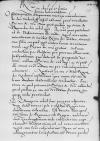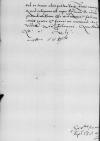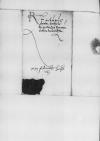List #2389
Samuel MACIEJOWSKI do Ioannes DANTISCUSVilnius, 1541-02-17
| odebrano Heilsberg (Lidzbark Warmiński), 1541-02-21 Rękopiśmienne podstawy źródłowe:
| ||||
Tekst + aparat krytyczny + komentarz Zwykły tekst Tekst + komentarz Tekst + aparat krytyczny
Reverendissimo in Christo Patri et Domino, domino
Reverendissime in Christo Pater et Domine, domine honoratissime.
Officiosissimam obsequiorum meorum commendationem.
De domino
Audivit ex ore
s(acrae) or s(erenissimae)⌈s(acrae)s(acrae) or s(erenissimae)⌉
Ex  BCz, 1597, p. 1182 sed ea tamen aliis postea litteris sunt annexa.
BCz, 1597, p. 1182 sed ea tamen aliis postea litteris sunt annexa.
Quod reliquum est, cupio Reverendissimam Dominationem Vestram quam diutissime esse incolumem et felicem, cuius gratiae et favori me commendo.
Dat(ae) or Dat(um)⌈Dat(ae)Dat(ae) or Dat(um)⌉
Eiusdem Dominationis Vestrae Reverendissimae servitor


